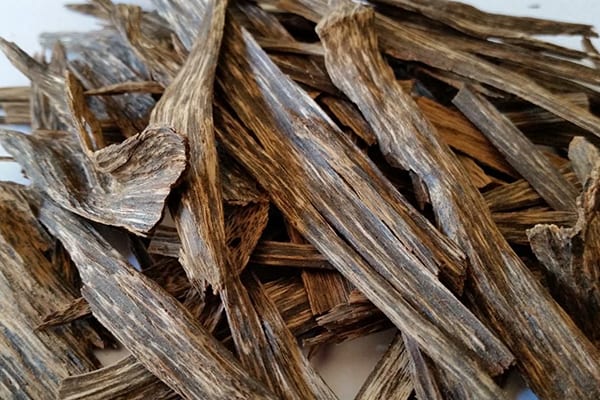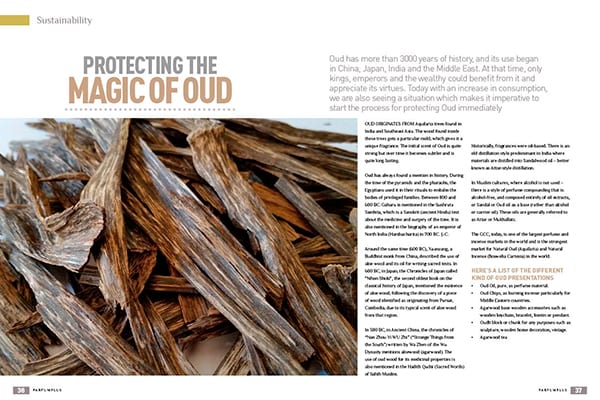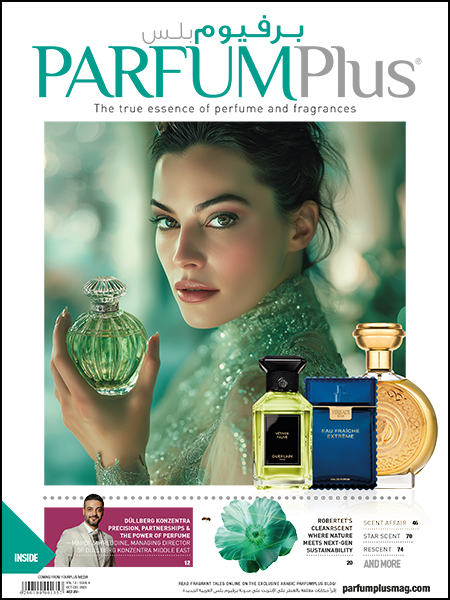Read this post in
 Arabic
Arabic
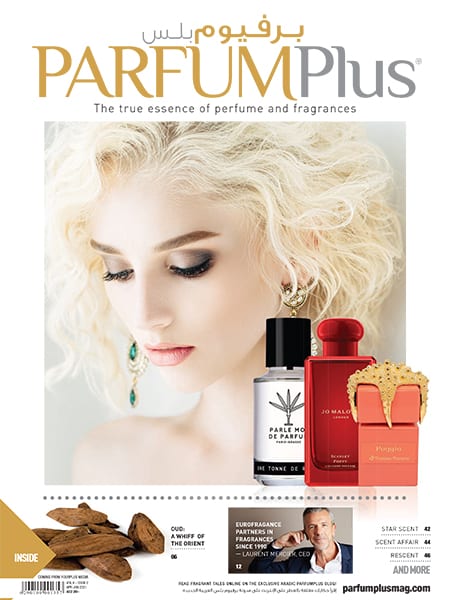
Protecting The Magic Of Oud
Oud has more than 3000 years of history, and its use began in China, Japan, India and the Middle East. At that time, only kings, emperors and the wealthy could benefit from it and appreciate its virtues. Today with an increase in consumption, we are also seeing a situation which makes it imperative to start the process for protecting Oud immediately
Oud originates from Aquilaria trees found in India and Southeast Asia. The wood found inside these trees gets a particular mold, which gives it a unique fragrance. The initial scent of Oud is quite strong but over time it becomes subtler and is quite long lasting.
Oud has always found a mention in history. During the time of the pyramids and the pharaohs, the Egyptians used it in their rituals to embalm the bodies of privileged families. Between 800 and 600 BC. Gaharu is mentioned in the Sushruta Samhita, which is a Sanskrit (ancient Hindu) text about the medicine and surgery of the time. It is also mentioned in the biography of an emperor of North India (Harshacharita) in 700 BC. J.-C.
Around the same time (600 BC), Xuanzang, a Buddhist monk from China, described the use of aloe wood and its oil for writing sacred texts. In 600 BC, in Japan, the Chronicles of Japan called "Nihon Shoki", the second oldest book on the classical history of Japan, mentioned the existence of aloe wood, following the discovery of a piece of wood identified as originating from Pursat, Cambodia, due to its typical scent of aloe wood from that region.
In 300 BC, in Ancient China, the chronicles of “Nan Zhou Yi WU Zhi” (“Strange Things fromthe South”) written by Wa Zhen of the Wu Dynasty mentions aloewood (agarwood). The use of oud wood for its medicinal properties is also mentioned in the Hadith Qudsi (Sacred Words) of Sahîh Muslim.
Historically, fragrances were oil-based. There is an old distillation style predominant in India where materials are distilled into Sandalwood oil – better known as Attar-style distillation.
In Muslim cultures, where alcohol is not used – there is a style of perfume compounding that is alcohol-free, and composed entirely of oil extracts, or Sandal or Oud oil as a base (rather than alcohol or carrier oil). These oils are generally referred to as Attar or Mukhallats.
The GCC, today, is one of the largest perfume and incense markets in the world and is the strongest market for Natural Oud (Aquilaria) and Natural Incense (Boswelia Cartesia) in the world.
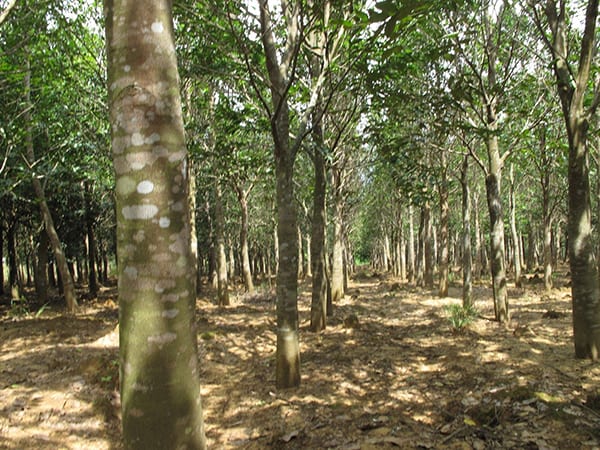
Here’s a list of the different kind of oud presentations
- Oud Oil, pure, as perfume material.
- Oud Chips, as burning incense particularly for Middle Eastern countries.
- Agarwood base wooden accessories such as wooden keychain, bracelet, liontin or pendant.
- Oudh block or chunk for any purposes such as sculpture, wooden home decoration, vintage.
- Agarwood tea
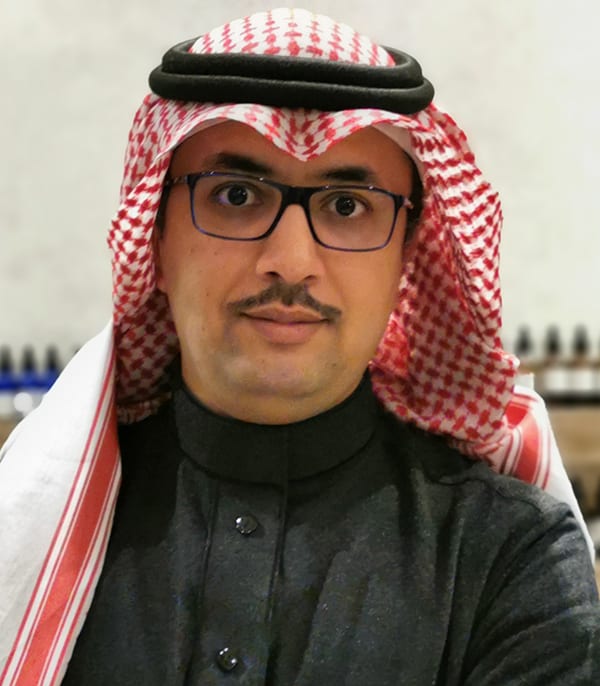
Saeed Alqarni, a Certified Natural Perfumer from Riyadh in Saudi Arabia, tells us more about Oud
“There is hardly any house in Saudi Arabia where you will not find oud or agarwood, used as incense (Bukhoor). It's impossible to find any occasion without oud whether it is big or small and social or religious since oud is one of the inherited customs that can't be forgone in Saudi Arabia.
Among the social occasions, which witness the use of Oud, are wedding parties and family occasions. As do religious occasions, they include festivals and religious seasons like Ramadan month, Hajj, and Umrah. Many mosques, also, burn Oud every day.
A large proportion of people consider it as a daily supplement to their elegance. The usage is seen on clothes, to scent houses, cars and even at work. Additionally, it is frequently used as a gift. When you want to give somebody a gift, the first thing that comes to your mind is maybe a fragrance and some Oud. As a result, it has become one of the pillars of Saudi heritage.
A few years ago, getting Oud was somewhat difficult for consumers since it was monopolized by some traders, so the consumers needed to go to the famous popular markets in the center of each city in the Kingdom in order to buy it. However, with e-commerce and the multiplicity of sale points, accessing and purchasing oud became easier. Several types and qualities are now available.
Saudi Arabia isn't very different from other Gulf countries in terms of habits and heritage, especially concerning Oud. However, its large area, population, and the high rate of consumption contributed to increasing the demand for Oud, thereby making it the highest consumer of it in the world.”
With popularity and accessibility increasing, a decline in natural Oud will become dramatic for GCC very soon. The Middle East has a very important cultural heritage; it is urgent to protect and invest in the preservation of Oud.
The International Perfume Foundation (IPF) is developing a program to protect Oud through a natural resource valuation approach for the benefit of local communities.

Sustainable Growing and Processing Aquilaria Planting Programs
To protect Oud and prove its sustainability IPF World Heritage Program and Teacher’s Academy implement best practices for processing aquilaria for Oud fragrance
using Best Practices
- Help plant growers develop sustainable organic agricultural best practices for growing and harvesting trees for fragrance, ensuring continuous sources of sustainable, high quality essential oud oils.
- Helping farms recognize the advantages of waiting until aquilaria trees mature before harvesting them to keep quality at the
highest levels. - Introducing effective agricultural methods allowing “cash” crops to be grown on the same parcel providing income while aquilaria trees are maturing.
- Introducing other plants and flowers to be grown along for perfumers or the same industry, as well as developing their distillation practices.
- Hire experienced harvesters to teach new harvesters and less experienced ones to secure the continuation of a sustainable supply chain.
- Certify growers and harvesters.
- Improve market access and increase value in trade to increase returns and employment opportunities, especially for poor and disadvantaged people.
- Create opportunities for conservation of ecosystems and preservation of valuable species.
- Coordinating with WWF and other groups protecting Aquilaria worldwide to remove aquilaria trees from red lists.
IPF aims to have everyone’s support in keeping the magical scents of oud enchanting our homes and hearts forever.
Read this post in
 Arabic
Arabic


